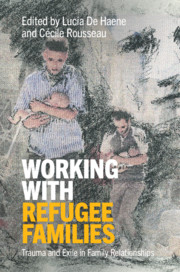Book contents
- Working with Refugee Families
- Working with Refugee Families
- Copyright page
- Dedication
- Contents
- Contributors
- Foreword
- Acknowledgments
- Introduction
- Part I Refugee Family Relationships
- Part II Trauma Care for Refugee Families
- Part III Intersectoral Psychosocial Interventions in Working with Refugee Families
- Chapter 16 Re-building Trust and Connectedness in Exile
- Chapter 17 Family-School Relationships in Supporting Refugee Children’s School Trajectories
- Chapter 18 Collaborative Mental Health Care for Refugee Families in a School Context
- Chapter 19 Interrogating Legality and Legitimacy in the Post-migratory Context
- Conclusion
- Index
- References
Chapter 19 - Interrogating Legality and Legitimacy in the Post-migratory Context
Working around Traumatic Repetition and Reenactment with Refugee Families
from Part III - Intersectoral Psychosocial Interventions in Working with Refugee Families
Published online by Cambridge University Press: 21 August 2020
- Working with Refugee Families
- Working with Refugee Families
- Copyright page
- Dedication
- Contents
- Contributors
- Foreword
- Acknowledgments
- Introduction
- Part I Refugee Family Relationships
- Part II Trauma Care for Refugee Families
- Part III Intersectoral Psychosocial Interventions in Working with Refugee Families
- Chapter 16 Re-building Trust and Connectedness in Exile
- Chapter 17 Family-School Relationships in Supporting Refugee Children’s School Trajectories
- Chapter 18 Collaborative Mental Health Care for Refugee Families in a School Context
- Chapter 19 Interrogating Legality and Legitimacy in the Post-migratory Context
- Conclusion
- Index
- References
Summary
"This chapter proposes that the notions of protection and family are negotiated in complex and often conflictual ways among refugee families and host country institutions, sometimes becoming pivotal parts of re-enactment scenarios in which the apprehended repetition of trauma transforms the potential protective nature of the host society into a space perceived as violent. After briefly situating this topic in the field of the legal consciousness studies, the plurality of meanings evoked by the concepts of family and protection is examined, as well as the ways in which the present refugee resettlement context transforms the perceptions of family members’ obligations and rights in a specific social space. Clinical situations are presented to show how what clinicians consider as legal obligations and boundaries need to be constantly interrogated from a legitimacy point of view and how this raises challenging ethical and clinical dilemmas for mental health and social professionals."
- Type
- Chapter
- Information
- Working with Refugee FamiliesTrauma and Exile in Family Relationships, pp. 309 - 321Publisher: Cambridge University PressPrint publication year: 2020
References
- 3
- Cited by

